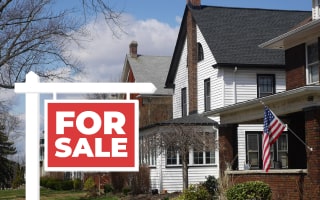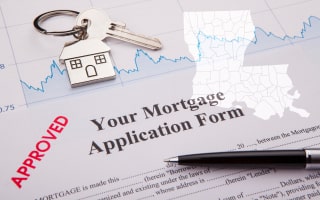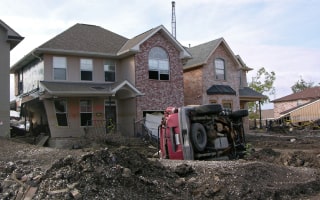Home Buying in Louisiana

The median home price in Louisiana is $264,000 (almost $200,000 below the national average), but that can vary from one city to the next. Here are some specific examples of median home prices in different communities:
- Baton Rouge is $289,000, but the median sold price is $211,000.
- Shreveport is $205,000, but the median sold price is $255,000.
- Metairie is $367,000, but the median sold price is $307,000.
- New Orleans is $350,000, but the median sold price is $357,000.
- Lafayette is $275,000, but the median sold price is $189,000.
While housing costs are low, wages in Louisiana are ranked at 46th out of the 50 states, with the median household average of $54,000. That's probably not enough to qualify for a mortgage of $146,000 that comes with $1,340 per month payments. That's because mortgage lenders won't allow borrowers to take out loans for more than 28 percent of their income. Unless the borrower can lower the mortgage amount with a more than 20 percent down payment or interest rates drop enough to lower the monthly premium well below $1,300, the median household income isn't enough to afford an average home.
Home Buying in Louisiana
More than 67 percent of Louisiana homes are owner-occupied, posing challenges for the real estate market. Owner-occupied units are a reason there's a shortage of homes for sale in many states. Long term owners are less likely to sell when interest rates are high. If they sell, they would need to get a new mortgage at a higher rate and make higher monthly payments for their next home.
When budgeting to buy or rent a new place, remember to consider utilities. Along with oppressive humidity that requires air conditioning, Louisiana is noted for having low internet service rates, and in this state you're likely to save a little over the average American who pays $473 per month for electricity, internet, and heat or cooling. In Louisiana the average cost of utilities is $350.
The average rate of home value appreciation in the country is 6.5 percent per year, but in Louisiana it's closer to 2 percent. When deciding whether to buy or rent, the length of time you plan to live in Louisiana should be a factor. It takes more than 10 years for the average monthly rent in Louisiana, $1,100, to become less economical than an investment in a median-price home. That's because mortgage payments on a $228,000 (median price) home at 6.5 percent interest are about $1,320 per month (plus PMI, taxes, etc.). If you plan to stay longer than 10 years and can afford the payments, buying a home should reward you financially with equity – meaning your investment should appreciate in value.
Properties sell faster in peak season, which is summer, when it takes an average of 53 days for a home to sell, but the time of year is important. In winter, it's not uncommon for homes to sit for 80 days or more before selling, and they often sell for less than the median value. Having a down payment saved and being prequalified for a mortgage allows you to move quickly when you find a good fit. A down payment of 20 percent is key, along with a good work history and 600 or better credit score. (Your credit score can be lower if you have a 20 percent down payment saved.) Making prompt payments on debts improves your credit score, which is based on your payment history and your income-to-debt ratio.
Finding the Right Home

Sellers of residential properties must make a lengthy seller's disclosure about the past and current condition of the site, inside and outside. It covers things like:
- The source of utilities, such as private vs. public water sources, bottled or piped gas, and the presence of any solar panels
- Whether a flood has resulted in an insurance payment and the amount
- If the property has been the site of a drug manufacturing laboratory and if it was certified as decontaminated
- If the property has been damaged by a storm
- Details about access and easements, including any homeowner's associations
- Whether there's a solution mining injection well within .5 miles
A thorough seller's disclosure is a starting point for buyers and their home inspection team to determine the extent of any issues and calculate the potential costs of necessary repairs. If serious issues are found, the selling price of the property may be renegotiated. The buyer's bid and down payment should be contingent upon the property passing inspection without significant issues. The buyer's mortgage company may also deny the purchase if significant issues appear on the property appraisal.
Owning property in an unincorporated or agricultural community in rural Louisiana may be appealing for the beauty and solitude, but only after serious consideration of the following:
-
Access to emergency services
-
Travel time to work or health care
-
Losing electricity and post-storm clean-up
Urban areas in Louisiana can offer access to cultural amenities, but they require additional considerations:
-
State and local property taxes
-
Traffic congestion and pollution
-
Crime
What is the Typical Home Buying Process in Louisiana
A real estate buyer's agent can help narrow your search to a region a reasonable commute to work, within a good school district, and that includes aspects of the lifestyle you desire. Hiring a buyer's agent can help you make the most efficient use of your time and ultimately the right investment in housing.
In addition to facilitating your search for a property, buyer's agents help write an offer and negotiate the price using knowledge of comparable sales in the area. They may also know about homes about to go on the market, giving you a slight advantage.
Look to your buyer's agent for important background information like the price history of a home, pros and cons of the area, and property taxes. They help find an inspector, renegotiate the price if there are issues, and keep the closing on track.
Buyers must now sign a contract with their buyer's agents. Instead of splitting the 5-6 percent commission with the seller's agent, buyer's agents now negotiate their commission. The contract describes their role and payment.
The process of buying a home includes these steps:
-
Save for a down payment and get prequalified for a mortgage.
-
Ask friends and colleagues for recommendations for a buyer's agent.
-
Decide on the region and type of housing desired.
-
Consider the costs and benefits of renting vs. buying.
-
Find the right property.
-
Write an offer.
-
Examine the property with an inspector and consider the seller's disclosure information.
-
Transfer the down payment.
-
Ensure there are no defects on the deed.
-
Close the deal and pay closing costs.
Financing Your Home Purchase

Saving for a down payment and paying off debt can be the toughest parts of buying a home. You can learn a lot from the mortgage prequalification process which determines how much home you can afford.
Louisiana is more affordable than many states, but the median household income is also below average. A household income of $57,800 is not enough to get a mortgage for the median home that costs $264,000 – unless you have a significant down payment ready. Your debt-to-income ratio, credit score, and down payment amount must all comply with the mortgage lender's requirements. Mortgage lenders won't allow people to spend more than 30 percent of their income on mortgage payments.
To get a mortgage, ask at your local bank as well as mortgage brokers to find a loan with good terms (interest rate, required PMI). Your local bank may extend special benefits for being a regular customer. If you're comfortable with mortgage terms, consider mortgage brokers who have access to a wide variety of options.
Prequalifying can take a while. Your credit score must be at or above 640, and your income-to-debt ratio and history of on-time payments must meet high standards. Start by getting free copies of your credit report (from Experian, Equifax, and TransUnion) to correct any errors that could delay an application.
The federal interest rate is another piece of the mortgage puzzle that is contributing to higher payments for buyers. It is set by the Federal Reserve and is currently at its highest rate in years. Experts say this is keeping longtime homeowners from selling because they would trade a low-interest loan for a high-interest loan at a new home.
It's possible to assume the seller's mortgage. This may allow you to take over the current owner's mortgage, which can have a much lower rate than is currently offered. Most USDA, FHA, and VA loans are assumable if you qualify. However you have to pay off the owner's equity, which is the difference between the amount left on the mortgage and the property's selling price. To do this you're likely to need a second mortgage.
When interest rates are high (rates rise and fall incrementally over periods of years) fixed-rate mortgages are less desirable. Adjustable rate mortgages can be risky because the interest rate can change during the term of the loan. Jumbo loans are allowed in specific areas of the country where home prices are high and mortgages of $760,000 to $1 million are required.
Mortgage options include these government programs:
- In addition to downpayment assistance programs, Louisiana Housing Corporation has counselors who can explain the home buying process and walk you through it.
- FHA mortgages are tailored for first-time buyers with down payments of less than 5 percent.
- Rural properties may qualify for USDA loans, especially buyers with low incomes, but good credit scores.
- Military veterans and their surviving spouses may seek a Veterans Administration -underwritten VA loan. These mortgages do not require PMI and may be used multiple times by qualifying individuals.
Home Insurance

Louisiana suffers from frequent storm damage, including $5 billion in damage in the past five years from hurricanes, tropical cyclones, and even winter storms. It's currently averaging $2,800 for a $200,000 home, close to the national average. In Louisiana, it averages $3,500 per year for a $300,000 home. Other states that experience frequent storms, like Oklahoma, pay as much as $5,000 for the same amount of coverage.
Property insurance in Louisiana is not required by law, but mortgage companies often require PMI, a type of insurance, to protect their interest in the property. PMI is required when your down payment is less than 20 percent. The cost is generally between $400 and $1,400 per month in addition to your mortgage payment, but varies according to your credit score.
Read your homeowner's policy carefully to understand what is covered. In many cases a shed, garage, or fence must be specifically listed to be insured. Appliances and personal possessions inside the home may not be covered by insurance unless they're included on an additional rider.
Home Buying Challenges
Homeowner's insurance in Louisiana is expected to increase by double digits due to dynamics of the insurance industry and the cost of home repairs. According to the National Association of Realtors, Louisiana homeowners may see a 23 percent increase in home insurance premiums in one year, with more to come. In fact, some states that suffer frequent severe storms may find insurers pulling out entirely, refusing to write policies altogether.
Louisiana's 23 percent increase was by far the largest, with some premiums going up to $7,800 a year. Maine's 19 percent increase was next-largest, but premiums there will only average $1,500 per year. Michigan was next, with a 14 percent increase and Utah is expected to see a 13 percent increase. Some Florida homeowners pay $11,000 for their insurance.
Recent changes to insurance laws in Louisiana extend the period for a roof fortification grant program for homeowners and require insurance companies to pay claims within 60 days of receiving paperwork. Changes also affect the 3 year timeframe for insurance companies to discontinue homeowner's policies.
Louisiana Home Inspections
Louisiana is subject to hurricanes, tornadoes, thunderstorms, floods, and winter storms, all of which can severely damage property. Anyone looking to buy a house in Louisiana should opt for a home inspection. The home inspection can help detect hidden problems with the property that could be costly to fix. It can also give the buyer negotiation power if the inspector finds anything serious.
A Louisiana home inspection examines the home's structural integrity and checks major systems, appliances, and safety features. Some of the items the inspector will focus on include:
-
Structural Elements: The inspector will review the foundation, walls, floors, ceiling, and stairs for signs of decay or damage.
-
Roof: Inspectors check the condition of the shingles, flashing, gutters, and chimney, examining them for leaks or other signs of wear and tear.
-
Home Exterior: They will also check the home's exterior (siding, windows, doors, etc.), looking for leaks or signs of damage.
-
Heating, Ventilation, and Air Conditioning (HVAC): Inspectors will test the heat, air conditioning, and ventilation systems to ensure they operate correctly and comply with safety codes.
-
Plumbing: The inspection also includes checking pipes, fixtures (tubs, sinks, toilets), and the water heater, as well as looking for any leaks, damage, or other issues.
-
Electrical: Inspectors will also examine wires, outlets, electrical panels, circuit breakers, and light fixtures for safety and compliance.
-
Attic: Attics, too, can have issues that could be costly to fix, like insulation, ventilation, water damage, and rodents.
-
Foundation: An inspector will search the foundation for water damage, leaks, and cracks, indicating more significant problems.
-
Interior: They will also examine the house's interior (walls, ceilings, floors, windows, etc.), looking for signs of damage or structural issues.
-
Tests: Some include tests for mold, radon, termites, asbestos, lead paint, and other contaminants.
A standard home inspection in Louisiana can range between $350 and $500, but it can also be as low as $325 and as high as $650, depending on the property's size, age, and condition.
The Process
In a Louisiana real estate transaction, the buyer usually pays for the home inspection because it helps them assess the home's condition before purchase. The process looks like the following:
- Find a reputable, affordable home inspection firm.
- Schedule the inspection according to the contract terms quickly.
- Show up and ask questions. They usually take between 2 and 4 hours.
- Review the final report and decide what to do.
The top five home inspection companies in Louisiana are:
- ProHome Inspection Services - Baton Rouge, LA
- House Call Inspection Acadiana - Lafayette, LA
- C.W. Inspections, LLC - Baton Rouge, LA
- HDMK Inspection Services - New Orleans, LA
- Accurate Property Inspections - Covington, LA
After the Inspection
After the inspection, the inspector must put all the findings into a written report for the buyer. They give copies to all interested parties. The buyer then has some options available to them if the report finds things that need fixing. The options are as follows:
- Save money by negotiating a lower price due to the repairs needed.
- Ask the seller to make the repairs before closing.
- Ask for a home warranty.
- Secure a reduced down payment.
- If significant issues are found, the buyer can even walk away from the deal without losing any money.
Inspection Top Cities
| City | Inspection Cost | Local Issues | Local Rules | Local Home Types |
|---|---|---|---|---|
| Home Inspection in New Orleans | $300-$700 depending on the size of the property. | Moisture, drainage, age, and poor condition of the home. | Buyers have 10-15 days after signing the contract to have an inspection done. | Creole cottages, American and Creole townhouses, shotgun houses, and double-gallery homes. |
| Home Inspection in Baton Rouge | $300-$600 based on the property's size and specific services requested. | Roofing, electrical, plumbing, and HVAC. | Inspectors must be licensed by the Louisiana State Board of Home Inspectors (LSBHI). | Single-family homes, townhouses, condos, and multi-family properties. |
| Home Inspection in Shreveport | $300-$600 based on the property's size, age, and location. | Roof, electrical wiring, plumbing, and HVAC. | Inspectors must adhere to the Louisiana State Board of Home Inspectors (LSBHI) standards and code of ethics. Reports are due within 5 days after the inspection. | Single-family homes, condos, townhouses, and apartments. |
| Home Inspection in Metairie | $425-$700 based on the size of the property and complexity of the inspection. | Roofing, electrical wiring, plumbing, and HVAC. | Inspectors must adhere to the Louisiana State Board of Home Inspectors (LSBHI) standards and code of ethics. | Single-family homes, ranch-style homes, and contemporary designs. |
| Home Inspection in Lafayette | $300-$500 based on the home's size, age, and other factors. | Roofing, electrical, plumbing, and HVAC. | Inspectors must adhere to the Louisiana State Board of Home Inspectors (LSBHI) standards and code of ethics. | Single-family homes, condos, townhouses, duplexes, and multi-family units. |
Instant Access to Louisiana Property Records
- Owner(s)
- Deed Records
- Loans & Liens
- Values
- Taxes
- Building Permits
- Purchase History
- Property Details
- And More!